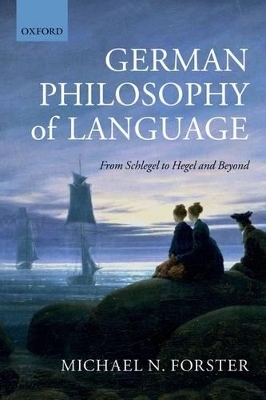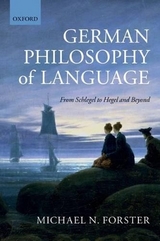German Philosophy of Language
From Schlegel to Hegel and beyond
Seiten
2013
Oxford University Press (Verlag)
978-0-19-968749-7 (ISBN)
Oxford University Press (Verlag)
978-0-19-968749-7 (ISBN)
Michael Forster presents a ground-breaking study of German philosophy of language in the nineteenth century, and its continuing significance. This book explores the lasting impact of J. G. Herder's work in the tradition, and traces his legacy in the philosophy of Friedrich Schlegel, Wilhelm von Humboldt, and G. W. F. Hegel.
Michael Forster here presents a ground-breaking study of German philosophy of language in the nineteenth century (and beyond). His previous book, After Herder, showed that the eighteenth-century philosopher J.G. Herder played the fundamental role in founding modern philosophy of language, including new theories of interpretation ('hermeneutics') and translation, as well as in establishing such whole new disciplines concerned with language as anthropology and linguistics. This new volume reveals that Herder's ideas continued to have a profound impact on such important nineteenth-century thinkers as Friedrich Schlegel (the leading German Romantic), Wilhelm von Humboldt (a founder of linguistics), and G.W.F. Hegel (the leading German Idealist). Forster shows that the most valuable ideas about language in this tradition were continuous with Herder's, whereas deviations from the latter that occurred tended to be inferior. This book not only sets the historical record straight but also champions the Herderian tradition for its philosophical depth and breadth.
Michael Forster here presents a ground-breaking study of German philosophy of language in the nineteenth century (and beyond). His previous book, After Herder, showed that the eighteenth-century philosopher J.G. Herder played the fundamental role in founding modern philosophy of language, including new theories of interpretation ('hermeneutics') and translation, as well as in establishing such whole new disciplines concerned with language as anthropology and linguistics. This new volume reveals that Herder's ideas continued to have a profound impact on such important nineteenth-century thinkers as Friedrich Schlegel (the leading German Romantic), Wilhelm von Humboldt (a founder of linguistics), and G.W.F. Hegel (the leading German Idealist). Forster shows that the most valuable ideas about language in this tradition were continuous with Herder's, whereas deviations from the latter that occurred tended to be inferior. This book not only sets the historical record straight but also champions the Herderian tradition for its philosophical depth and breadth.
Michael N. Forster read P.P.E. at Oxford University, and earned his PhD in Philosophy at Princeton University. Since 1985 he has taught at the University of Chicago, where he served for ten years as chairman of the Philosophy Department and is currently Glen A. Lloyd Distinguished Service Professor in Philosophy. He is the author of six books on German philosophy, as well as many articles on German philosophy, ancient philosophy, and contemporary philosophy of language.
PART I: SCHLEGEL; PART II: HUMBOLDT; PART III: HEGEL; PART IV: AND BEYOND
| Erscheint lt. Verlag | 14.11.2013 |
|---|---|
| Verlagsort | Oxford |
| Sprache | englisch |
| Maße | 157 x 235 mm |
| Gewicht | 518 g |
| Themenwelt | Geisteswissenschaften ► Philosophie ► Geschichte der Philosophie |
| Geisteswissenschaften ► Philosophie ► Philosophie der Neuzeit | |
| Geisteswissenschaften ► Philosophie ► Sprachphilosophie | |
| ISBN-10 | 0-19-968749-8 / 0199687498 |
| ISBN-13 | 978-0-19-968749-7 / 9780199687497 |
| Zustand | Neuware |
| Haben Sie eine Frage zum Produkt? |
Mehr entdecken
aus dem Bereich
aus dem Bereich
Buch | Hardcover (2012)
Westermann Schulbuchverlag
34,95 €
Schulbuch Klassen 7/8 (G9)
Buch | Hardcover (2015)
Klett (Verlag)
30,50 €
Buch | Softcover (2004)
Cornelsen Verlag
25,25 €




